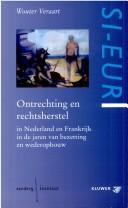| Listing 1 - 8 of 8 |
Sort by
|
Book
Year: 2005 Publisher: Place of publication unknown Kluwer
Abstract | Keywords | Export | Availability | Bookmark
 Loading...
Loading...Choose an application
- Reference Manager
- EndNote
- RefWorks (Direct export to RefWorks)
History of the law --- History of France --- History of the Netherlands --- anno 1940-1949 --- anno 1950-1959

ISBN: 9013030084 Year: 2005 Publisher: Deventer : Rotterdam : Kluwer ; Sanders instituut,
Abstract | Keywords | Export | Availability | Bookmark
 Loading...
Loading...Choose an application
- Reference Manager
- EndNote
- RefWorks (Direct export to RefWorks)
Jewish property --- Restitution --- World War, 1939-1945 --- History. --- Claims.
Book
ISBN: 9789089744128 9089744126 Year: 2010 Publisher: Den Haag : Boom Juridische uitgevers,
Abstract | Keywords | Export | Availability | Bookmark
 Loading...
Loading...Choose an application
- Reference Manager
- EndNote
- RefWorks (Direct export to RefWorks)
Forgiveness. --- Human rights. --- Restitution --- Restitution. --- Restorative justice --- Restorative justice. --- Netherlands.
Book
ISBN: 9789069167435 Year: 2009 Publisher: Nijmegen Ars Aequi Libri
Abstract | Keywords | Export | Availability | Bookmark
 Loading...
Loading...Choose an application
- Reference Manager
- EndNote
- RefWorks (Direct export to RefWorks)
Dissertation
Year: 2005 Publisher: Rotterdam Sanders Instituut
Abstract | Keywords | Export | Availability | Bookmark
 Loading...
Loading...Choose an application
- Reference Manager
- EndNote
- RefWorks (Direct export to RefWorks)
Summary in English
Book

ISBN: 9781618613394 Year: 2012 Publisher: New York RVP Press
Abstract | Keywords | Export | Availability | Bookmark
 Loading...
Loading...Choose an application
- Reference Manager
- EndNote
- RefWorks (Direct export to RefWorks)
Dealing with the restitution of property rights within a context of transitional justice involves many dilemmas. This book outlines some of these dilemmas in the context of the restitution processes, in the aftermath of World War II, in the territories of France, the Netherlands, Austria, West Germany, and Belgium. Written by prominent historical and legal experts in the field, a common thread running throughout the different chapters is the impact of the passage of time on restitution issues. On the one hand, the principle of non-retroactivity of laws and statutes of limitation can prevent restitution from taking place. On the other hand, the demand for restitution may become so strong that statutes of limitation may be suspended and past court decisions subject to review if, according to new insights, they are currently considered "unfair" in the light of the extreme injustice of the past. Special attention has been paid to two "looted art" cases: the Austrian Alma Mahler-Werfel Case, concerning the restitu- tion of the Munch painting Summer Night on the Beach, and the Dutch Goudstikker Case. With contributions by Claire Andrieu (Paris), Georg Graf (Salzburg), Ju rgen Lillteicher (Lu beck), Franz-Stefan Meissel (Vienna), Herman Schoordijk (Tilburg/Amsterdam), Arend Soeteman (Amsterdam), Veerle Vanden Daelen (Antwerp), Wouter Veraart (Amsterdam), and Laurens Winkel (Rotterdam).
Book

ISBN: 9789060310977 Year: 2011 Publisher: Amsterdam Scientia
Abstract | Keywords | Export | Availability | Bookmark
 Loading...
Loading...Choose an application
- Reference Manager
- EndNote
- RefWorks (Direct export to RefWorks)
Book

ISBN: 9789058503121 Year: 2006 Publisher: Nijmegen Wolf legal publishers
Abstract | Keywords | Export | Availability | Bookmark
 Loading...
Loading...Choose an application
- Reference Manager
- EndNote
- RefWorks (Direct export to RefWorks)
| Listing 1 - 8 of 8 |
Sort by
|

 Search
Search Feedback
Feedback About UniCat
About UniCat  Help
Help News
News